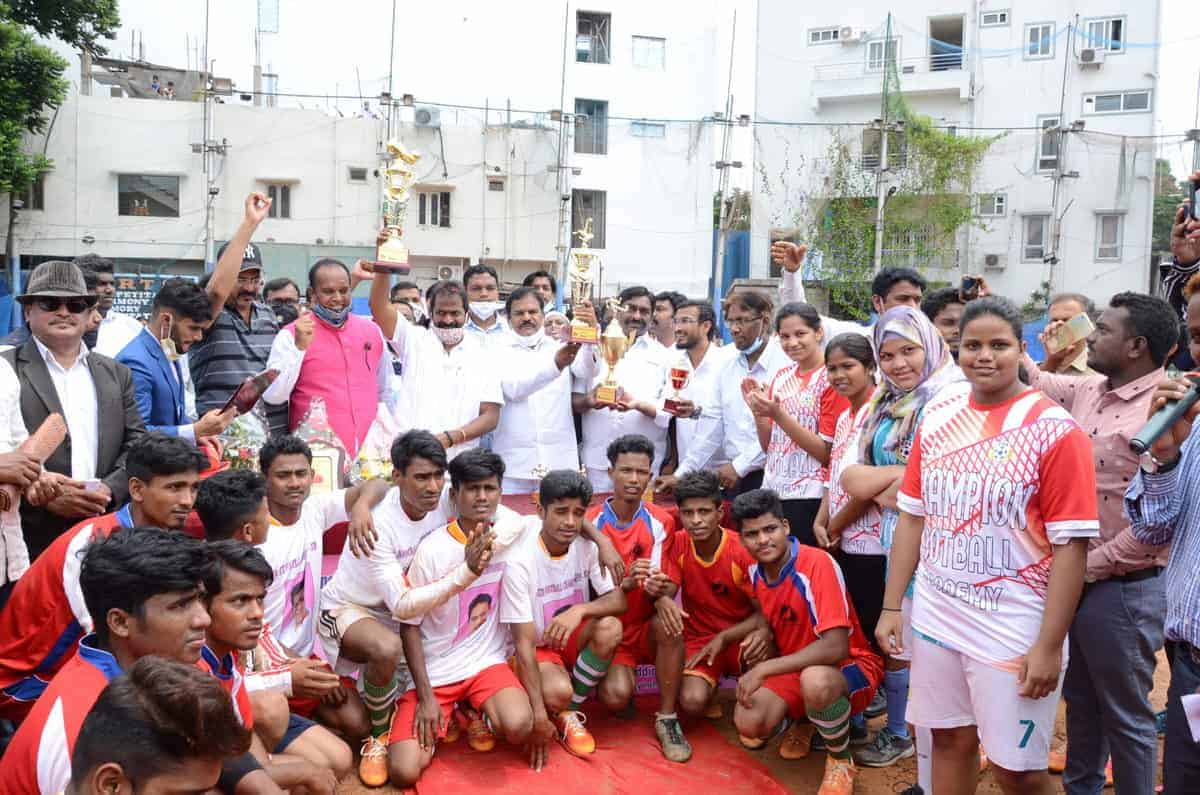Hyderabad: Bilal Hussain’s eyes lit up in excitement as he waits on the periphery of the football field and cheers for his son play for the Rohingya Football Club (FC). 52-year-old Hussain is overtaken by nostalgia watching his son play his favorite sport — football, a game that reminds him of his teammates back in Myanmar, the country he left behind.
As the Rohingya refugee crisis continues far away, the refugees are often called national security threats and infiltrators for seeking shelter in India. Yet in their own bid to prove themselves, youths belonging to this ethnic group living in refugee camps located in Balapur, Hyderabad, have formed a football team.

Hussain’s son Zia Ur Rahman is a member of the Rohingya FC, who are participating in the ‘KTR Football Championship 2020’ that commenced on Saturday. The tournament sees 14 teams battling it out at the Sports Coaching Foundation grounds at Masab Tank.
The teams consist of young players from various parts of the city and among these are two teams of Rohingya refugees that stand out the most. Consisting of players between ages 18 to 25, the team is an eclectic coterie of students, daily-wage laborers, construction workers, vegetable sellers, and others who make a living through low-paying jobs.
For the ongoing tournament, from the 50-member Rohingya FC, a smaller team named Quadri FC is formed. The team, supported by siasat.com, has participated in numerous tournaments in the past too.
Mohammed Sadiq (21), a goalkeeper of the Rohingya FC said, “Rohingya refugees are often seen through a particular ideological lens. Football has given us positive exposure and enabled us to tell the world that we are just like everyone else.”
“We are normal human beings too,” Sadiq, another Rohingya adds.
18-year-old Khaliq Ur Rehman says, “Earlier we use to play football in our refugee camps with barefoot and we didn’t have a ground. It was then, the activist Syed Moiz Quadri had motivated us and said that we play very well. He then had us enrolled in the local tournaments. Siasat.com provided us with the proper football kits including jerseys, socks and shoes, gloves, etc.”

Rehman further says, “We also got an opportunity to make many new Indian and Hyderabadi friends. Football has paved the way for constructive change, but sustaining the momentum is providing to be a challenge in a football match.”
In 2018, Rohingyas also participated in a football tournament organized by the United Nations High Commissioner for Refugees (UNHCR) at Quli Qutb Shah Stadium in Ghansi Bazar. Among the 16 teams participating in the tournament, three teams were from the Rohingya camps from Balapur, Jalpally, and Kishanbagh.
Abdullah (22) has also set up the team to motivate his community after clashes between Myanmar security forces and Rohingya militants. The incident led to more than 700,000 Rohingyas cross the border into India and here, they remain in refugee camps in various states.
Nearly 8,000 Rohingyas – a stateless minority of Myanmar live in Hyderabad, they are spread over the city settled in refugee camps at Balapur, Mehdipatnam, Jalpally and Kishanbag. Many usually work as laborers or sell vegetables and that’s how they managed to make a living.
The Rohingya FC, however, are united by their passion and love for football. Most players in the team had to start their life from scratch as they came into Hyderabad after undertaking a tumultuous journey from Myanmar.
“I started playing football as a child. It used to excite me a lot and I was also a part of the school team. We would watch Lionel Messi and Cristiano Ronaldo on TV and tried to emulate them. Those were happy days, but things changed when we had to leave our country,” Zia Ur Rehman (19) a player of Rohingya FC told siasat.com.
Moving to a new country meant leaving behind prized possessions, including the football team that he had played with. But the love for the game accompanied him to Hyderabad. Rehman, along with other football enthusiasts, started practicing football on the ground near Balapur dargah.
Activist Syed Moiz Quadri said, “Our aim is to familiarise Rohingya refugees in India with football, train them, and make a team with some of the best players. We want them to become a part of professional teams.”
“They have been through a lot of trauma already, and we want them to use their passion for football in a constructive manner,” he said.

